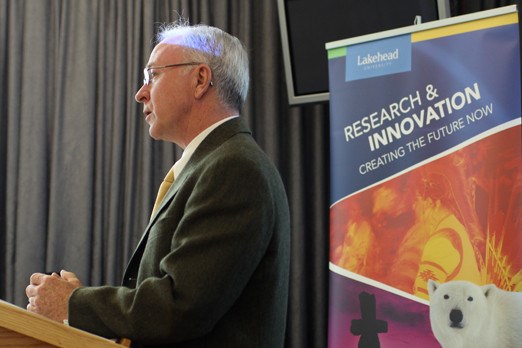Right or wrong, a university is judged mainly on its research funding.
Based on that merit, Lakehead University must be doing something right after receiving over $1 million in funding from the Social Sciences and Humanitarian Research Council. As a smaller university, Lakehead dean of graduate studies Philip Hicks said dozens of people are working constantly to come up with new ideas to attract funding from senior levels of government and industry.
The SSHRC funding, celebrated Wednesday morning at Lakehead, shows that the university can compete.
“This is a really good signal to us that we’re on the right track,” Hicks said. “We have to make sure that we continue.”
Lakehead is proof that a smaller university can make big contributions to new knowledge Hicks said.
“I think there is a perception out in the public that larger universities are the ones that should be doing all the research and the smaller universities should be content to just sit back and give bachelor degrees but we don’t accept that vision at Lakehead University.”
From women’s studies to geography, with projects ranging from internet policing to community-based forest management, students and staff at Lakehead will be able to study some interesting topics thanks to the SSHRC funding.
Outdoor Recreation, Parks and Tourism professor Harvey Lemelin was one of a dozen Lakehead faculty and graduate students to receive a grant. With the $110,900 he was awarded, Lemelin is studying the relationship between humans and insects. While most people tend to think of insects in a negative way, it’s a mutli-million dollar industry that’s hardly ever studied.
“There’s so little research done on the social dimension that I thought I could contribute,” Lemelin, who got the idea after attending a symposium on dragonflies six years ago.
Lemelin will use the money to hire research assistants who will interview people in three different regions to gauge their reactions to photograph of insects with interviews before and after.
He’s hoping to show through the over 300 planned interviews, the public aren’t as negative about insects as most people think. Butterfly pavillions and dragonfly ponds are just a few of the attractions the insect industry has much to a region’s economic benefit.
“It’s a big big industry and no one’s really looking at it,” Lemelin said.
